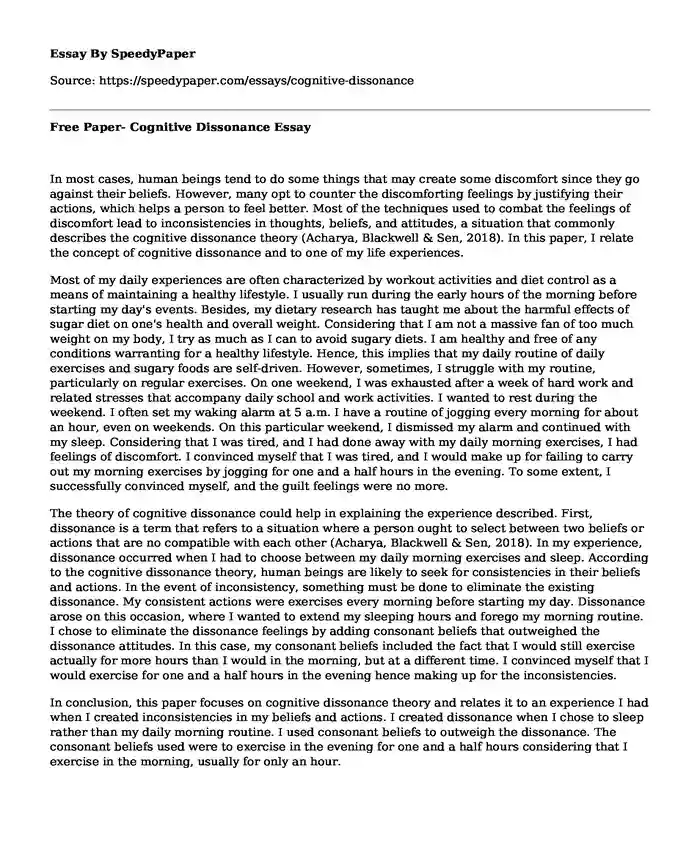
| Type of paper: | Essay |
| Categories: | Personal experience Behavior change Cognitive development |
| Pages: | 3 |
| Wordcount: | 631 words |
In most cases, human beings tend to do some things that may create some discomfort since they go against their beliefs. However, many opt to counter the discomforting feelings by justifying their actions, which helps a person to feel better. Most of the techniques used to combat the feelings of discomfort lead to inconsistencies in thoughts, beliefs, and attitudes, a situation that commonly describes the cognitive dissonance theory (Acharya, Blackwell & Sen, 2018). In this paper, I relate the concept of cognitive dissonance and to one of my life experiences.
Most of my daily experiences are often characterized by workout activities and diet control as a means of maintaining a healthy lifestyle. I usually run during the early hours of the morning before starting my day's events. Besides, my dietary research has taught me about the harmful effects of sugar diet on one's health and overall weight. Considering that I am not a massive fan of too much weight on my body, I try as much as I can to avoid sugary diets. I am healthy and free of any conditions warranting for a healthy lifestyle. Hence, this implies that my daily routine of daily exercises and sugary foods are self-driven. However, sometimes, I struggle with my routine, particularly on regular exercises. On one weekend, I was exhausted after a week of hard work and related stresses that accompany daily school and work activities. I wanted to rest during the weekend. I often set my waking alarm at 5 a.m. I have a routine of jogging every morning for about an hour, even on weekends. On this particular weekend, I dismissed my alarm and continued with my sleep. Considering that I was tired, and I had done away with my daily morning exercises, I had feelings of discomfort. I convinced myself that I was tired, and I would make up for failing to carry out my morning exercises by jogging for one and a half hours in the evening. To some extent, I successfully convinced myself, and the guilt feelings were no more.
The theory of cognitive dissonance could help in explaining the experience described. First, dissonance is a term that refers to a situation where a person ought to select between two beliefs or actions that are no compatible with each other (Acharya, Blackwell & Sen, 2018). In my experience, dissonance occurred when I had to choose between my daily morning exercises and sleep. According to the cognitive dissonance theory, human beings are likely to seek for consistencies in their beliefs and actions. In the event of inconsistency, something must be done to eliminate the existing dissonance. My consistent actions were exercises every morning before starting my day. Dissonance arose on this occasion, where I wanted to extend my sleeping hours and forego my morning routine. I chose to eliminate the dissonance feelings by adding consonant beliefs that outweighed the dissonance attitudes. In this case, my consonant beliefs included the fact that I would still exercise actually for more hours than I would in the morning, but at a different time. I convinced myself that I would exercise for one and a half hours in the evening hence making up for the inconsistencies.
In conclusion, this paper focuses on cognitive dissonance theory and relates it to an experience I had when I created inconsistencies in my beliefs and actions. I created dissonance when I chose to sleep rather than my daily morning routine. I used consonant beliefs to outweigh the dissonance. The consonant beliefs used were to exercise in the evening for one and a half hours considering that I exercise in the morning, usually for only an hour.
References
Acharya, A., Blackwell, M., & Sen, M. (2018). Explaining Preferences from Behavior: A Cognitive Dissonance Approach. Journal of Politics, 80(2), 400-411. https://doi.org/10.1086/694541
Cite this page
Free Paper- Cognitive Dissonance. (2023, Feb 08). Retrieved from https://speedypaper.net/essays/cognitive-dissonance
Request Removal
If you are the original author of this essay and no longer wish to have it published on the SpeedyPaper website, please click below to request its removal:
- Prey-Predator Interaction - Free Essay in Biology
- Essay Sample: Common Theme Between Xala and Faat Kine
- Factors that Influence Health, Free Essay Sample
- Free Essay Sample on Abstract Concept About Love
- Free Essay Example on Women and Grime Music
- Essay Example on the American Legal System and the Federal Judiciary
- Essay on Law and Order: The Secret to Human Development in Modern Times
Popular categories




